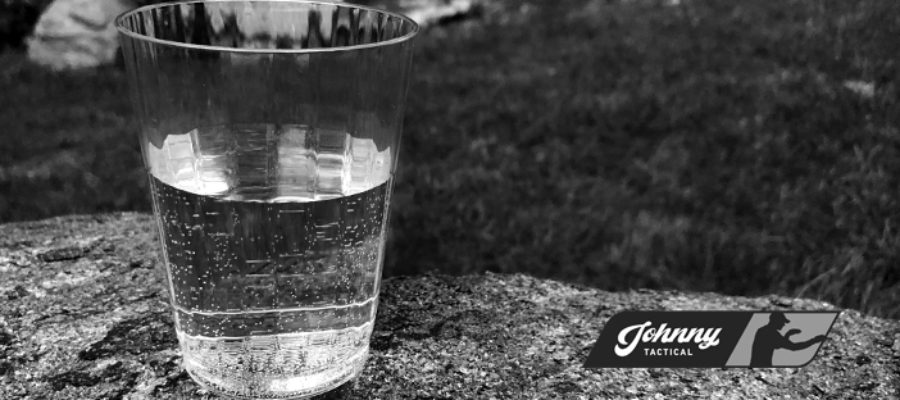The optimist says the glass is half full. The pessimist says the glass is half empty. Dispatch says someone called about a suspicious glass partially filled with an unknown liquid but didn’t ask any follow up questions and sent you to it anyway. The patrol officer says there’s no way to know what’s in the glass so they won’t take a report, but they will pay “special attention” to the area around where the glass was last seen. The SWAT operator says they’ll bet you $50 they can hit the glass from 100 yards in full kit from the standing position using only iron sights. Administration says there will be a new SOP coming out mandating that all encounters with drinking glasses be documented in a report and anyone who shoots a glass will be disciplined.
Editor’s Note: Apart from a lesson on mindset this is also a textbook example of how SOPs are made.
You’re All Biased
We all have biases, whether we realize it or not. They are often a result of our own past experiences, the experiences of others, a mere opinion, or cursory information that may or may not be true. This doesn’t mean any one particular bias is necessarily wrong, it just means that it’s going to influence our thoughts and actions and lead us to a particular result or conclusion. If it’s correct, great, but if not, it could be a really bad day.
Like the pessimist who sees every circumstance from a perspective of fear, or the optimist who thinks nothing could possibly go wrong, either could be proven to be right in any given situation, but both suffer from their own personal bias. In police work I’ve seen these opposing mindsets flesh out like this: the pessimist says Why bother? the optimist says Why not? Both mindsets are, in a way, self-fulfilling prophecies.
Why Bother?
The problem with the Why bother attitude is that you work off the assumption — the bias — that nothing good is going to happen. The operation or call for service is not legitimate or a waste of time, or that you’re not going to find whatever or whoever you are looking for. It’s like putting on a pair of blinders, or in extreme cases, a blindfold, causing you to not see or perceive clear and present dangers. It is setting yourself up to fail before you even begin.
Why Not?
The problem with the Why not attitude is that you work off the assumption — the bias — that nothing bad is going to happen. You think tactics and officer safety are overkill or unnecessary, you develop tombstone courage, or become infatuated with the lust for the bust. It’s throwing caution to the wind and ignoring red flags. It is celebrating a victory before ever stepping onto the field of play.
It’s A Trap
In my experience the two most common areas where officers go wrong has to do with searches — searches of people and searches of places. Officers seem to fall into one category or the other; they are either the pessimist (often the veteran) or the optimist (often the rookie).
It’s easy for officers to fall into the trap of making the assumption that the person they encounter isn’t concealing anything and perform a merely cursory, incomplete search. Why? Because they’ve developed a bias that after 999 searches, they’ve never found anyone or anything dangerous, so why would this time be any different? Intellectually, we all know the answer to that, but we’ve all been guilty of it at one time or another.
Or they decide not to wait for backup and start searching a car with their back to the suspect or break the rules of room clearing or officer safety because they know “this is the big one” and safety concerns become an anchor or a burden, slowing down their sprint to the finish line and their place at the award ceremony.
Tactical Optimism
Somewhere in the middle of both extremes lies tactical optimism — which is a term I completely made up, but bear with me. Tactical optimism is simply the expectation of success seasoned with a healthy amount of fear. It is doing the work up front by preparing and training, followed by recognizing threats, mitigating them, and executing the mission. It’s seeing problems as opportunities, weighing both risk and reward, and planning for success while allowing for contingencies.
When it comes to planning, it’s easy to plan for when things go wrong. Having an exit strategy and multiple contingencies is pretty standard. Planning for success can actually be more challenging, especially when it comes to big wins. Make sure you know what to do when things go better than anticipated.
Police work is dangerous and taking things for granted is a luxury we cannot afford. Fear is a God-given emotion, a sense, an intuition, that keeps us alive. To be afraid is to be human. There is nothing wrong with being afraid as long as we don’t let fear control our decisions or our actions. The truth is that a healthy amount of fear keeps us from doing dumb things and will work to our advantage.
When we take our training, our experience, our preparation, and sprinkle it with a healthy amount of fear we put ourselves in a position to make good decisions, to gain the advantage, and to avoid the naive extremes of either the why bother or the why not attitude.
Here’s how to develop tactical optimism:
Train
• Learn how to search both people and places safely.
• Learn and utilize proven tactics.
• Most skills are perishable which means they must be practiced regularly — use them or lose them.
Prepare
• Care for your gear and have it with you and ready to go.
• Mentally prepare through visualization
Know What To Look For
• Learn about behavioral cues for violent encounters, watch for them, and proactively take countermeasures.
• Learn to read terrain and identify threat areas.
• Don’t assume it will be right in front of your face. Look for weighted bulges in a person’s clothing, indexing of the waistband, or a rising elbow. When searching rooms look for a foot or a hand as opposed to an entire person.
Plan For Success
• Know what to do when things go as planned. Failing to plan for success is as bad as failing to plan for contingencies.
Allow For Contingencies
• Anticipate problems, have options available, and be ready to pivot.
__________________________
- Are you a pessimist or an optimist?
- Do you find yourself saying Why bother? or Why not?
- What skills do you need to brush up on?
- What is your view of fear?
__________________________
Thanks for reading! Do you have a story that you think we could learn from and that you’d like to share with Johnny Tactical nation? Fill out the contact form and include your name, rank, and department, or email it to [email protected] and follow these guidelines:
– It must be a firsthand account
– True
– Have a lesson, principle, or tactic to apply
– Cleaned of names, dates, and places
– Include your call sign
If your story is selected and published in our blog you’ll get the credit using your call sign and we’ll send you a free Live Tactical t-shirt!





Leave a Reply
Your email is safe with us.
You must be logged in to post a comment.